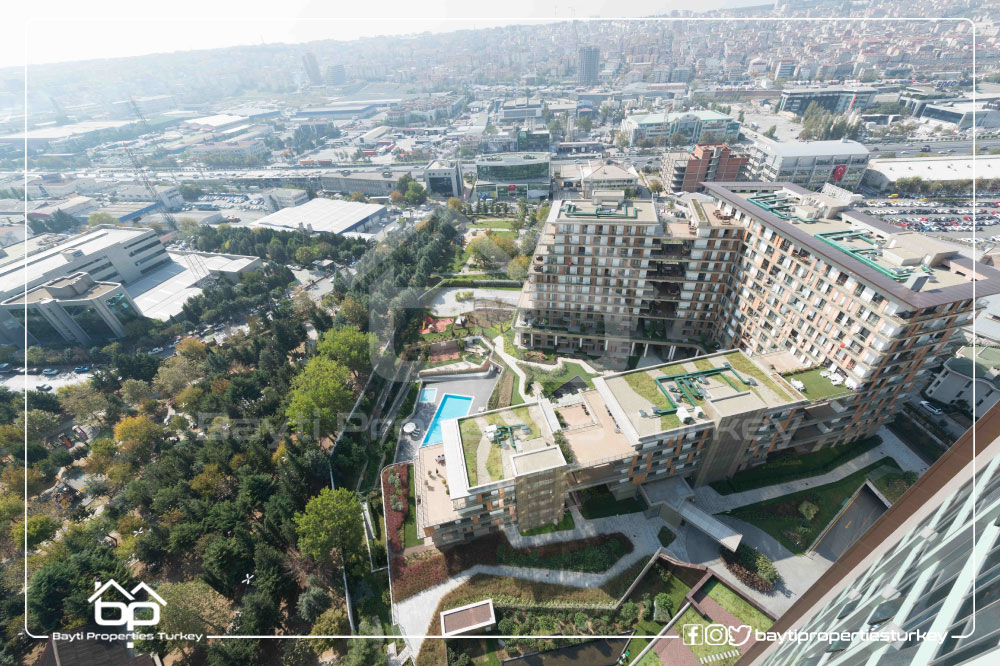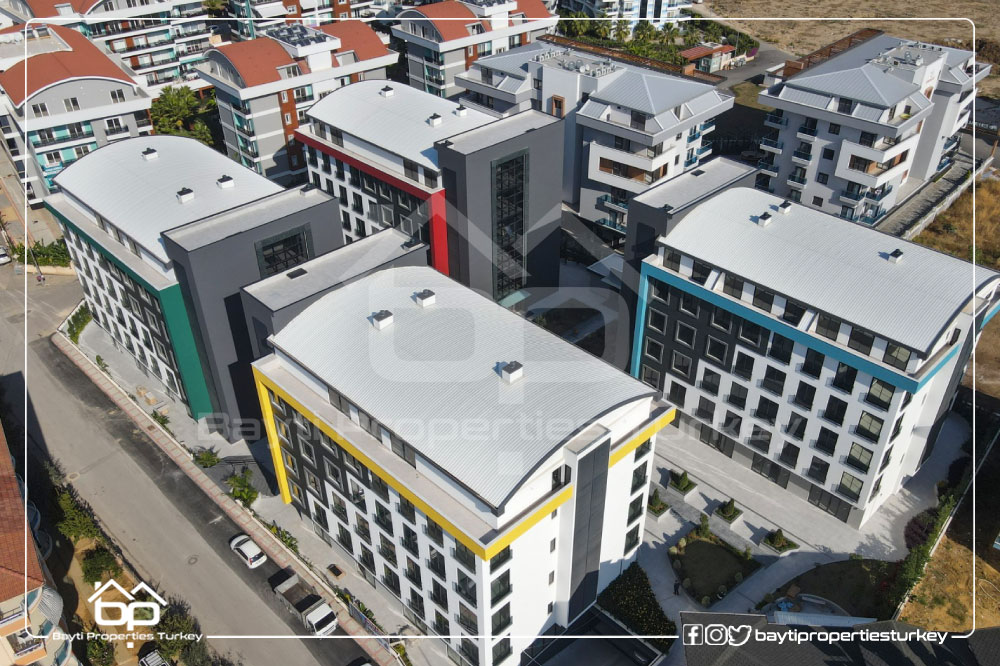Introduction
Are you drawn to the unique blend of cultures and history that Istanbul has to offer? Are you considering investing in Istanbul’s real estate market or just wanting to explore the city as a tourist?
Then this comprehensive guide is for you. Istanbul is a fascinating city situated at the crossroads of Europe and Asia, with a rich history spanning over 2,000 years.
Its strategic location on the Bosphorus Strait has made it an important center for trade and commerce throughout history. Today, its real estate market and booming tourism industry are some of the most vibrant in the world.
The Importance of Understanding the Connection Between Real Estate and Tourism
The connection between real estate and tourism is undeniable. A strong tourism industry often leads to an increase in demand for short-term rentals, which can boost rental incomes for landlords.
It can also lead to higher property values due to increased demand from both local and foreign buyers looking for vacation homes or investment properties. On the other hand, a decline in tourism can have negative effects on both short-term rentals and property values.
Understanding this connection is essential if you’re considering investing in Istanbul’s real estate market or even just planning a trip to explore its many wonders. By gaining insights into these two industries, you’ll be equipped with valuable knowledge that can help guide your decisions as either an investor or tourist seeking accommodation options.
In this guide, we’ll provide an overview of Istanbul’s real estate market and its current state along with popular neighborhoods for investors and homebuyers. We’ll also discuss key factors affecting property prices in Istanbul along with tips for first-time investors and legal requirements for foreign investors interested in buying properties here.
Moving on from there, we’ll delve into Turkey’s flourishing tourism industry by highlighting some of its most popular attractions including Hagia Sophia, Blue Mosque, Grand Bazaar etc., along with exploring how it impacts Istanbul’s real estate market. We’ll also provide insights on navigating the buying and rental processes in Istanbul from a foreigner’s perspective, including common mistakes to avoid.
By the end of this comprehensive guide, you’ll be well-equipped with valuable information to confidently invest in Istanbul’s real estate market or plan your visit as a tourist. So let’s begin our journey into Istanbul’s rich history and flourishing industries!
The Connection Between Istanbul’s Real Estate and Tourism Industries
Istanbul is a city that has been undergoing significant changes in recent years. The booming tourism industry has brought more visitors to the city, and this has had an impact on the real estate market. In turn, real estate development has also influenced the tourism industry.
An Overview of Istanbul’s Real Estate Market
Istanbul’s real estate market is a dynamic and complex environment that is affected by many factors. The city’s population growth, economic stability, and political situation all have an impact on the demand for housing.
In general, Istanbul’s real estate market can be divided into two categories – residential and commercial properties. Residential properties are further subdivided into apartments, villas, and luxury homes.
There are several popular neighborhoods in Istanbul that are sought after by investors and homebuyers alike. These include Beyoglu, Besiktas, Kadikoy, Uskudar, Sariyer and Bebek.
The Importance of Understanding the Connection Between Istanbul Real Estate and Tourism Industries
The connection between Istanbul real estate and tourism industries is crucial to understanding how they both influence each other. As more tourists visit Istanbul each year, they provide a boost to the local economy which increases demand for housing.
This increased demand leads to higher prices for properties which incentivizes developers to build more. Understanding how these two industries interact with each other can help tourists make better decisions about where to stay or invest while in Istanbul.
Furthermore, it helps investors make informed decisions about purchasing property in areas of high tourist traffic or areas with strong potential for future growth. In short- whether you’re a tourist looking for accommodations or an investor seeking profitable opportunities – understanding this connection between the two industries can help you make smart decisions that suit your needs while maximizing your returns!
Istanbul’s Real Estate Market
“Is Istanbul’s real estate market a smart investment decision or just another bubble waiting to burst? Let’s dive in and examine the current state of the market.The real estate market in Istanbul is highly competitive, with properties available for every budget range.
As one of the largest cities in Europe, Istanbul offers endless opportunities for investors and homebuyers alike. In recent years, the market has been experiencing a steady increase in demand, making it an attractive location for those interested in investing.
Current State of the Market According to recent data from TurkStat, Turkey’s statistical agency, Istanbul had the highest number of residential sales among all Turkish cities with 17.6% share and 7.5% growth compared to last year’s September figures.The overall trend appears to be positive but it should be noted that certain neighborhoods are seeing higher rates of growth than others.
Popular Neighborhoods
– Beşiktaş: This area is known for its luxury apartments with beautiful sea views.
It is a favorite spot of wealthy investors and expats. – Kadıköy: An up-and-coming district on the Asian side of Istanbul, Kadıköy offers affordable property options close to public transportation.
– Şişli: A central location with easy access to shopping centers and public transportation, Şişli has become increasingly popular among young professionals. – Beyoğlu: Home to trendy cafes, bars and restaurants, Beyoğlu offers a unique living experience suitable for young couples or singles.
Factors Affecting Property Prices
Several factors influence property prices in Istanbul including:
1) Location: Properties near popular tourist attractions or main transportation hubs tend to have higher prices. 2) Age and condition of the property: Newer buildings or recently renovated properties tend to have higher value.
3) Neighborhood: Certain neighborhoods may be more desirable than others, leading to fluctuations in price. 4) Supply and Demand: As demand for properties increase, so does the price.Understanding these factors can help investors make informed decisions about where to invest their money.
Investing in Istanbul Real Estate
If you’re considering investing in Istanbul real estate, it’s important to weigh the advantages and disadvantages before making any decisions. One major advantage of investing in Istanbul is that property prices are relatively affordable compared to other major cities around the world.
Additionally, with a growing population and economy, there is a high demand for housing in Istanbul, which can lead to good returns on your investment. However, there are also some potential disadvantages to consider.
One issue is the lack of transparency in the real estate market and potential for fraud or scams. It’s important to thoroughly research any properties or developers before investing your money.
Tips for first-time investors
If you’re a first-time investor in Istanbul real estate, there are some key tips to keep in mind. First and foremost, make sure you do your research and work with a reputable agent who has experience working with foreign investors. They can help guide you through the buying process and ensure that all legal requirements are met.
It’s also important to consider the location of the property carefully. Look for neighborhoods that are up-and-coming but still affordable—these areas may see significant growth in property values over time.
Legal requirements for foreign investors
Foreigners are allowed to purchase property in Turkey without any restrictions, but there are some legal requirements that must be met. For example, if you’re not a Turkish citizen, you’ll need to obtain a Turkish tax identification number before purchasing any property.
You’ll also need to hire an official translator to translate all relevant documents into your native language so that you fully understand what you’re signing. And finally, be aware of any taxes or fees associated with purchasing property as a foreigner—these can add up quickly if you’re not prepared.
Keep these tips and requirements in mind as you weigh the pros and cons of investing in Istanbul real estate. With careful planning and the right guidance, it can be a great way to grow your wealth over time.
Exploring the Tourism Industry in Istanbul
Istanbul has always been an attractive destination for tourists, thanks to its unique blend of history, culture, and modernity. The city attracts millions of visitors from around the world every year, making it one of the most popular tourist destinations in Europe. The tourism industry in Istanbul is an essential contributor to the city’s economy, generating billions of dollars annually.
Popular Tourist Attractions and Activities
Istanbul has a wealth of attractions for tourists to explore. Among the must-see sights are Hagia Sophia Museum, Blue Mosque, Topkapi Palace Museum, Grand Bazaar, Galata Tower, and Dolmabahce Palace.
For more adventurous travelers, there are also plenty of outdoor activities available in Istanbul. One can take a boat ride along the Bosphorus Strait that separates Europe and Asia or enjoy a hot air balloon ride over Cappadocia’s unique landscape.
Impact of Tourism on Real Estate Market
The tourism industry has had a significant impact on Istanbul’s real estate market. Given Istanbul’s growing reputation as a tourist destination worldwide and its strategic location between two continents (Europe and Asia), it makes sense that investors would want to invest in real estate there.
The influx of tourists has led to an increase in demand for short-term rental apartments and hotels. Property owners have found it profitable to rent out their properties on Airbnb or other platforms during peak tourist season when hotel rates are high.
This trend has positively impacted property prices as foreign investors have recognized this opportunity for investment. Moreover, many upscale hotels have opened up in recent years catering specifically to luxury-seeking visitors who are willing to pay top dollar for premium services like high-end restaurants or spa facilities.
This trend is expected only to continue as Turkey continues its march towards modernization while retaining its unique cultural identity. The tourism industry in Istanbul is a crucial contributor to the city’s economy and has led to an increase in demand for real estate.
The many attractions and activities available to tourists make Istanbul an attractive destination that will continue to draw visitors from all over the world. The impact of tourism on the real estate market has not only benefited investors but also contributed to the development of more modern and upscale facilities that cater specifically to tourists’ needs.
Short-term Rentals in Istanbul
Travelers from around the world flock to Istanbul to experience the blend of rich history and modern culture. With increasing demand for short-term rentals, property owners in Istanbul are capitalizing on this opportunity by renting out their homes or apartments on Airbnb and other vacation rental platforms.
Airbnb Regulations and Restrictions
While short-term rentals can be a lucrative venture, there are certain regulations that property owners must follow. Airbnb is officially legal in Turkey, but there are restrictions both on hosts and guests. For example, hosts must register with the government and pay a 1% accommodation tax per booking.
Additionally, hosts cannot rent out their properties for more than 90 days per year. Violating these regulations can result in hefty fines or even imprisonment.
Pros and Cons of Short-term Rentals for Property Owners
Despite the regulations, many property owners see short-term renting as a profitable investment opportunity. One of the main advantages is the potential for higher returns compared to long-term rentals.
Short-term renters are often willing to pay a premium for convenience, flexibility, and unique experiences that traditional hotels cannot provide. However, short-term rentals do come with some drawbacks as well.
One significant disadvantage is the uncertainty of occupancy rates during low seasons or unexpected events such as pandemics or political instability. Additionally, managing multiple bookings and cleaning routines can be time-consuming for property owners who may already have busy schedules.
Overall, deciding whether to rent your property through Airbnb or similar platforms depends on your financial goals and lifestyle preferences. It’s important to do research beforehand so you can make an informed decision that fits your needs as a property owner in Istanbul’s real estate market.
Navigating the Buying Process Steps to buying a property in Istanbul as a foreigner
Buying a property in Istanbul as a foreigner can be a bit daunting, but it is certainly doable with the right guidance. Before you start looking for properties, you will need to obtain a tax number and open a bank account in Turkey.
You will also need to hire an independent lawyer who is fluent in both Turkish and your native language. Once you have found your dream property, you will make an offer and negotiate the price with the seller.
If your offer is accepted, you will sign a preliminary sales contract which outlines all of the details of the sale, including payment terms and timelines. After making your deposit payment (usually 10% of the purchase price), both parties will sign the final sales contract which must be notarized by an official Turkish notary. Common mistakes to avoid during the buying process
One common mistake that foreign buyers make when purchasing property in Istanbul is failing to conduct proper due diligence before making an offer. It is crucial that you hire an independent lawyer who can thoroughly review all legal documents related to the sale and ensure that there are no liens or encumbrances on the property.
Additionally, it’s important to understand that many properties in Istanbul are sold “as-is,” meaning that any needed repairs or renovations are your responsibility as the buyer. Another mistake that buyers should avoid is failing to fully understand all of their financial obligations related to purchasing property in Turkey, including taxes, fees, and other costs associated with owning real estate.
Conclusion
After exploring the real estate and tourism industries in Istanbul, it’s clear that these two sectors are tightly intertwined. With an ever-growing tourism industry, investing in Istanbul real estate can be a lucrative business opportunity. Understanding the current state of the market, popular neighborhoods and legal requirements for foreign investors is crucial to success.
For first-time investors, it’s important to weigh the advantages and disadvantages of investing in Istanbul real estate. While property prices are generally lower than other major cities, there may be challenges with navigating the buying process as a foreigner.
For property owners interested in short-term rentals, it’s important to consider Airbnb regulations and restrictions before making any decisions. While short-term rentals can provide a steady income stream, there may be limitations on how often a property can be rented out.
While there may be challenges involved with investing in Istanbul real estate and navigating its tourism industry, there are also great opportunities for those willing to put in the effort. With research and proper planning, investors can succeed in both industries simultaneously.












